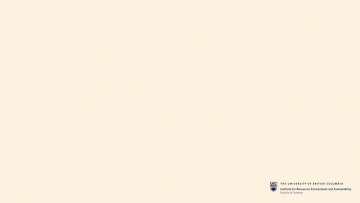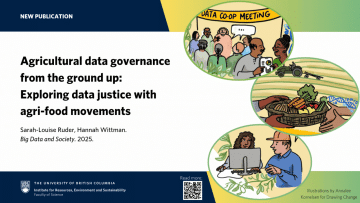Apply Now: Sessional Lecturer for ASIC 220
IRES invites applications for a part-time Sessional Lecturer position for a comprehensive introduction to sustainability from January to April 2026.
Emily Shilton, IRES alumna, sounds alarm on vaping as Canada’s “addictive e-waste problem”
Shilton’s research reveals how nicotine vaping devices—small, battery-powered electronics—are slipping through regulatory cracks, causing serious environmental concerns.
As the World Confronts Climate Change, the US Leaves Our Future Behind
Former and current UN special rapporteurs David Boyd and Elisa Morgera are featured in The Nation, noting that a recent opinion from the Inter-American Court of Human Rights fails to call directly for broad fossil fuel phaseout.
3 PhD & 2 Postdoc positions at UCLouvain with former IRES visiting prof Patrick Meyfroidt
Announcing positions at UCLouvain in collab with IRES’s Navin Ramankutty! Examining land use and democratic backsliding via cross-country studies + cases in Europe, Canada (northern BC & AB, YT & NT), Mozambique.
World’s top court paves way for climate reparations
“The court’s clear and detailed articulation of state obligations will be a catalyst for accelerated climate action and unprecedented accountability,” Dr. David Boyd responds to the International Court of Justice’s historic statement that climate change is an urgent and existential threat and countries have a legal duty to prevent harm from their planet-warming pollution in France 24.
Want a Carbon Fix? It’s Closer than You Think
Carbon sequestration solutions like kelp and forests do more than just capture carbon. Dr. Kai Chan is featured in the Tyee for his advice on the benefits carbon sequestration can have on both animals and overall ecosystems
Jiaying Zhao helps people enjoy protecting the planet
Can we make meaningful climate action feel happy instead of miserable? Dr. Jiaying Zhao answers this and more in the American Psychological Association.
How a lottery-style refund system could boost recycling
Dr. Jiaying Zhao and Jade Radke are featured in the Conversation for their innovative study to increase recycling rates through a green lottery. If done right, offering a chance to win a higher amount of money for recycling can meaningfully increase recycling rates, contribute to a circular economy and allow people to choose the refund option that works best for them.
Two global Frontiers Planet Prize winners call for a future of diversified farming
For James and Klassen, who were PhD students at IRES while contributing to the award-winning study, what matters most is what comes next. Will the world be willing to do the hard work of supporting farmers diversify their practices?
Rethinking agricultural data through a justice lens
Governments are increasingly asking farmers to share more data, especially around environmental concerns like nutrient management. And the private sector is racing ahead with new digital tools. But the question remains: who benefits?









